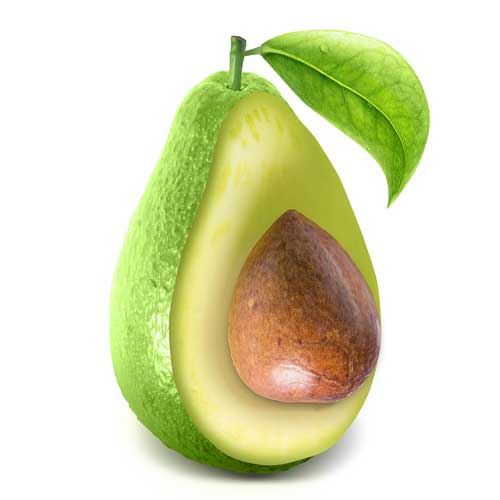
Can eating just one avocado a day have an impact on your cholesterol level? According to the Centers for Disease Control and Prevention, the number of people taking statin medications to lower their cholesterol continues to rise. Unfortunately, not everyone can tolerate the side effects of this class of medications.
One of the most common symptoms people taking statins experience is muscle pain and weakness, sometimes severe enough that they have to stop taking them. Other potential side effects include increased blood sugar and liver damage. It’s usually better if you can correct a problem through lifestyle rather than resort to medications with their unpredictable side effects.
Not only are statins linked with side effects, if you only have a mildly elevated cholesterol, but it may also normalize through lifestyle and dietary changes. At one time, going on a cholesterol-lowering diet meant reducing the amount of fat in your diet. These days, the emphasis has shifted to choosing healthy fats. An example is an avocado, the fruit that’s in the guacamole sauce you eat with Mexican food. But avocados have transcended Mexican food as people discover new and creative ways to enjoy their goodness.
Avocados are one of the only fruits that contain fat, but the fat in avocados is a healthy variety known as monounsaturated fat, the kind you also find in nuts and olive oil. Like all fats, avocado in recipes gives foods creamy texture, but as new research shows, it may also improve your lipid profile as well.
Avocados to Lower Your Cholesterol?
In a new study published in the Journal of Clinical Lipidology, researchers found eating as little as one avocado a day helps lower cholesterol. After analyzing the results of 10 studies looking at avocado-rich diets and lipids, the researchers concluded that replacing foods high in saturated fat with avocado was linked with lower total cholesterol, LDL-cholesterol, as well as a reduction in triglycerides. Avocado consumption had little impact on HDL-cholesterol, the so-called “good” cholesterol associated with a lower risk of coronary artery disease.
How does avocado lower cholesterol? Although the exact reason is unknown, one possibility relates to the cholesterol-lowering effect of beta-sitosterol, a type of plant sterol. Beta-sitosterol is similar in structure to cholesterol, enough so that it competes for absorption in the small intestine. As such, you absorb less cholesterol, as much as 50% less, when you consume plant sterols, like beta-sitosterol. Margarine makers add plant sterols to processed margarine and market it for heart health. It’s healthier to get beta-sitosterol from natural sources like avocados. In fact, avocados have the highest level of plant sterols of any fruit.
Other Health Benefits of Avocados
With their abundance of healthy fats, avocados have other health benefits as well. Like olive oil, avocados contain oleic acid, a component of olive oil that may lower the risk of some forms of cancer, including breast cancer. In lab studies, oleic acid promotes cancer cell death through a process called apoptosis.
How’s your vision? Avocados are an excellent source of carotenoids, including lutein and zeaxanthin. These two components protect against age-related eye diseases, like cataracts. They work their magic by absorbing the eye-damaging components of ultraviolet light you’re exposed to every day.
The high content of zeaxanthin and lutein in avocados may also partially explain the cholesterol-lowering benefits of avocados as they decrease LDL-cholesterol as well as reduce the oxidation of cholesterol. Oxidized cholesterol is especially damaging to the inner walls of arteries and contributes to heart disease and stroke.
Vitamins, Minerals, and Phytochemicals
Avocados are also rich in vitamins and minerals, including vitamin C, vitamin E, vitamin K, and some B vitamins as well as the mineral magnesium. They’re also a good source of phytochemicals, including polyphenols and flavonoids, which help keep inflammation in check. Research has linked diets rich in avocados with a lower risk of metabolic syndrome and type 2 diabetes.
Avocados are unique among fruits because they’re significantly higher in fat and contain very little sugar. Unfortunately, they’re also relatively high in calories. One avocado has around 322 calories. Of course, they’re also very filling and satisfying, so you may eat less if you include avocado in your diet.
Adding More Avocado to Your Life
Yes, eating an avocado daily may help lower your cholesterol level and you’ll never run out of ways to enjoy its creamy goodness. Here are some ways to enjoy it that go beyond guacamole sauce:
Spread avocado on whole grain toast in place of butter. It’s just as creamy!
How about avocado on pizza? Yes!
Use it to make a creamy salad dressing. The fats in avocado help you absorb fat-soluble nutrients.
Cut an avocado in half. Remove the seed and fill the space on each side with chicken salad, tuna salad, or egg salad.
Spread avocado on bread as a replacement for mayo.
Blend avocado into soups and smoothies.
Use avocado to make creamy and healthier chocolate mousse. (recipes available online)
Use it to make creamy chocolate brownies too.
Add slices to your next sandwich.
Add avocado to your next batch of hummus.
The Bottom Line
Avocados have powerful health benefits, particularly when it comes to the health of your heart. Plus, they’re versatile – you can enjoy one as a substitute for butter or mayo or add them to salads and pizza. You can even use them to make healthy desserts. Yum! Experiment with different ways to prepare them and enjoy their health benefits.
References:
Journal of Clinical Lipidology. January-February, 2016Volume 10, Issue 1, Pages 161-171.
Nutr Hosp. 2012 Nov-Dec;27(6):1860-5. doi: 10.3305/nh.2012.27.6.6010.
J Am Diet Assoc. 2001 Apr;101(4):404-5.
Life Extension. “Beta-Sitosterol: An Anti-Inflammatory and Anti-Cholesterol Plant Extract
Beta-Sitosterol: An Anti-Inflammatory and Anti-Cholesterol Plant Extract”
Crit Rev Food Sci Nutr. 2013 May; 53(7): 738-750.
Related Articles By Cathe:
Summer Superfood: The Tasty, Health Benefits of Avocados
5 Powerful Reasons to Add Avocado to Your Diet
The Healthy Cooking Oil You Probably Aren’t Using

